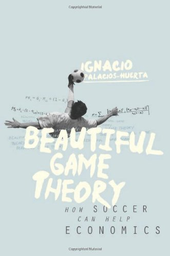
More often I would take the opportunity to pester him on sporting matters. One September the conversation turned to penalty kicks. In that year's All-Ireland football final, the Dublin goalkeeper (Paddy Cullen) saved a penalty from Liam Salmon (here). He explained how it was more difficult to score a penalty in gaelic football than in soccer because of the smaller goal area and the greater distance between the penalty spot and the goal line. In his efforts to explain how a penalty kick should be taken, he sketched out a set of goalposts in the condensation on the windows. He explained how, if the kick had minimum level of force, there was some area that the goalkeeper could not cover. A successful penalty was determined purely by the execution of the kick. As I grew older I encountered this situation a few times. When I took a penalty kick, I never saw it as a contest between myself and the goalkeeper.
Now as an economist I use the penalty kick to help students towards an understanding about mixed strategies in game theory. In doing so I have to somewhat park the lessons of my childhood. In the classroom the goalkeeper has a role to play. And, the goalkeeper had a role to play in one or two of the penalty kicks I struck. I remember one particularly kick from a penalty shootout to decide a drawn cup game. I kicked the ground just before the ball and the ball travelled towards the line inches to the left of the goalkeeper. Fortunately, he had shifted his weight to cover a shot to his right and could not recover to stop the poorly taken penalty. However, such experiences did not shake my conviction in the belief that the kicker was in charge of his/her own fate.
I wonder if there are students who do not believe the goalkeeper has a role and to what extent does such a conviction militate against their understanding of mixed strategies. To help convince them, and myself, I rely heavily on the work of Ignacio Palacios-Huerta and the account of his work provided by Kuper and Szymanski in Soccernomics. In his book, Beautiful Game Theory, Palacios-Huerta examines over 9,000 penalty kicks. He begins by examining the mixed strategy predicted by game theory. He then compare the predictions of the theory with the actual frequencies used by kicker and goalkeeper. He finds no significant statistical difference between the frequencies predicted by theory and those used in practice. It seems the soccer players can "do the math".
 RSS Feed
RSS Feed